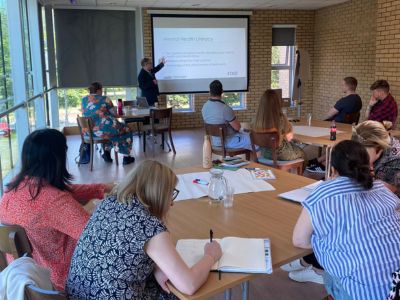
Bridget Phillipson confirms that all pupils will sit a mandatory reading test at age 13 to drive up reading standards
Bridget Phillipson says:
There is one barrier in particular I worry is locking young people out. Because before a child can even begin to engage in everything their school has to offer, they must first be able to read.
When they can’t, the sense of dejection sets in. Engagement seeps away. Attendance follows.
Reading holds the key to so much. There is no foundation more important.
So we will introduce a statutory assessment in year 8 to assess reading fluency and comprehension.
We’ll test progress at this key point when too many children either spin their wheels or fall further behind.
Invaluable data for schools to make sure no child’s need for more, for a helping hand, can slip through the cracks.
Read the Press Release
Key takeaway points
The government is initiating a national drive to raise literacy standards, focused primarily on the start of secondary school. The key points of this announcement are:
- Mandatory Reading Test: A new statutory assessment will be introduced for all pupils in Year 8 (age 13) to assess reading fluency and comprehension.
- Purpose of Assessment: The test is designed to be a snapshot in time to identify reading gaps early, provide invaluable data to schools, and ensure targeted help is given to those who need it, preventing students from falling behind.
- Wider Ambition: The government is setting a new national goal for 90% of children to meet the expected standard in the Phonics Screening Check at the primary level.
- Accountability and Data: While the results will be made available to Ofsted and the government, individual schools’ results will not be published. However, schools are required to share children’s results with parents.
- Support and Resources: The plan is supported by:
- Expansion of the English Hubs programme in the reception year.
- New training for secondary school teachers to support young people to read.
- A £1 million fund to help high-need schools purchase reading programmes and resources.
- The upcoming National Year of Reading 2026 to promote reading for pleasure.
What’s the impact over the next 12 Months?
The introduction of a mandatory Year 8 reading assessment, alongside the ambitious 90% phonics goal, will trigger a period of intense and focused operational change in schools, particularly in the secondary sector, over the next 12 months.
The most immediate impact will be the need for curriculum recalibration in Key Stage 3. For many secondary schools, explicit, whole-class reading instruction tends to diminish after Year 7. The new statutory test, however, places reading fluency and comprehension squarely at the top of the Year 8 agenda. Over the next year, school leaders will be compelled to re-evaluate how they allocate time and resources. This will likely involve dedicating more curriculum hours to explicit reading lessons, possibly integrating them into subjects beyond English, or creating non-negotiable, scheduled intervention slots for struggling readers in Years 7 and 8.
Furthermore, the requirement to generate and utilise “invaluable data” will drive significant investment in diagnostic tools and staff training. Schools cannot wait for the first official test; they must establish robust internal tracking systems now to baseline students and monitor progress. This means identifying and implementing suitable screening and diagnostic tools to pinpoint specific deficits (e.g., phonological awareness, decoding, or comprehension strategies). The data generated will demand an exponential increase in the capacity for targeted, evidence-based intervention. The limited £1 million government fund will need to be supplemented by school budgets to acquire proven reading programmes and train a dedicated cohort of teaching assistants and teachers to deliver them with fidelity.
A key shift will also occur in Professional Development (CPD). The government’s provision of new training is a clear signal that literacy is now every teacher’s business. Over the next 12 months, secondary schools will need to deliver extensive, high-quality training sessions to ensure all subject teachers—from Science to Art—understand and apply the principles of disciplinary literacy. This is crucial for students to access the complex vocabulary and structures of different subjects, ensuring they are not “held back” from the rest of their education.
Finally, the accountability mechanism will force rapid action. While results are not published externally, the data will go to Ofsted. This alone makes the Year 8 assessment a high-stakes focus, prompting leaders to undertake rigorous internal evaluation and self-assessment of their entire literacy strategy. Concurrently, the need to share results with parents necessitates the development of clear, sensitive, and supportive communication strategies, turning a raw data point into a plan of action that fosters strong home-school partnerships. This combined pressure ensures that improving reading will become the single most dominant strategic priority across the school system in the forthcoming academic year.
Would you like further support to understand drivers of poor academic attainment?

Achieve mental health excellence and drive up attainment with AMHIE’s DfE-aligned training. The clear ROI lies in empowering your staff to understand and address the root causes of poor attainment that stem from mental health and well-being issues. We equip your team with certified competence to strategically embed a proactive whole-school approach, removing non-academic barriers to learning. By improving student well-being, you unlock potential, enhance focus, and create an environment where all children can excel, securing outstanding educational outcomes. Join over 1,500 trained leaders who trust AMHIE.
Ready to link well-being to academic success and boost attainment? Explore the full AMHIE training offer and secure your team’s place today: Visit the AMHIE Training Page

